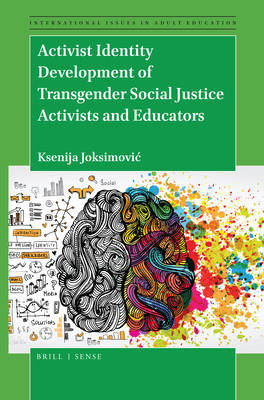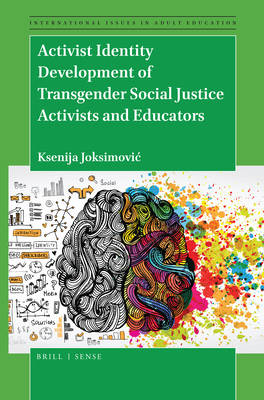
Je cadeautjes zeker op tijd in huis hebben voor de feestdagen? Kom langs in onze winkels en vind het perfecte geschenk!
- Afhalen na 1 uur in een winkel met voorraad
- Gratis thuislevering in België vanaf € 30
- Ruim aanbod met 7 miljoen producten
Je cadeautjes zeker op tijd in huis hebben voor de feestdagen? Kom langs in onze winkels en vind het perfecte geschenk!
- Afhalen na 1 uur in een winkel met voorraad
- Gratis thuislevering in België vanaf € 30
- Ruim aanbod met 7 miljoen producten
Zoeken
Activist Identity Development of Transgender Social Justice Activists and Educators
Ksenija Joksimovic
€ 209,45
+ 418 punten
Uitvoering
Omschrijving
Activist Identity Development of Transgender Social Justice Activists and Educators introduces an anti-oppressive, critical and intersectional approach to social justice activism and education, and adult education for social change. This book examines how state governments, laws, policies, institutions, and systems of dominant hegemonic ideologies, such as education systems, the legal systems, and their gatekeepers influence the social position and epistemic agency of transgender and gender non-conforming people (TGNC), therefore shaping their social justice activist and educator identity development. The research was conducted with eight TGNC social justice activists and educators from eight different countries, who were at the time in leadership positions in organizations working on the advancement of LGBTQI human rights.
This volume seeks not only to understand and interpret power structures, power relations and inequalities in society which determine social positionality of trans activists and influence the formation and development of their activist identity, but also to challenge them by raising critical consciousness, questioning dominant cultural, political, and social domains which determine knowledge production. It advocates for a trans-affirming, intersectional approach to educational provision, theory, and research.
This volume seeks not only to understand and interpret power structures, power relations and inequalities in society which determine social positionality of trans activists and influence the formation and development of their activist identity, but also to challenge them by raising critical consciousness, questioning dominant cultural, political, and social domains which determine knowledge production. It advocates for a trans-affirming, intersectional approach to educational provision, theory, and research.
Specificaties
Betrokkenen
- Auteur(s):
- Uitgeverij:
Inhoud
- Aantal bladzijden:
- 188
- Taal:
- Engels
- Reeks:
- Reeksnummer:
- nr. 31
Eigenschappen
- Productcode (EAN):
- 9789004425088
- Verschijningsdatum:
- 5/03/2020
- Uitvoering:
- Hardcover
- Formaat:
- Genaaid
- Afmetingen:
- 155 mm x 236 mm
- Gewicht:
- 430 g

Alleen bij Standaard Boekhandel
+ 418 punten op je klantenkaart van Standaard Boekhandel
Beoordelingen
We publiceren alleen reviews die voldoen aan de voorwaarden voor reviews. Bekijk onze voorwaarden voor reviews.









